

With the cost of college tuition at an all time high, some may wonder if it is even worth it to invest the time and money it takes to earn a four-year degree. In state tuition at a state school is, on average, more than five times as expensive as it was in 1990 — which could put a huge financial burden on students and their families.
Still, a college education can be incredibly beneficial. The right degree from a good school can lead to many more and higher paying job opportunities otherwise unavailable to less educated workers.
24/7 Wall St. reviewed data from the U.S. Census Bureau’s 2016 American Community Survey to identify the most educated city in each state. Nationwide, 31.3% of American adults have earned a bachelor’s degree. However, college attainment rates vary greatly by state — from 42.7% of adults in Massachusetts to 20.8% in West Virginia. As a result, the best educated city in some states are home to a lower concentration of college educated adults than the U.S. as whole. In other cities on this list, over half of all adults have a bachelor’s degree or higher.
Click here to see the most educated city in every state.
Click here to read our detailed findings and methodology.

1. Alabama
> Most educated city: Huntsville
> Pct. of adults with a bachelor’s degree or higher: 36.8%
> Median household income: $58,238
> Unemployment rate: 3.6%
> Number of postsecondary institutions: 11
Home to both Alabama A&M University and the University of Alabama Huntsville, the Huntsville metro area is Alabama’s most educated. The higher education level could be a contributing factor in Huntsville’s higher median household income of $58,238 a year. Statewide, just 24.7% of adults have at least a college degree — well below the 36.8% share in Huntsville — and the median household income is $46,257.
[in-text-ad]
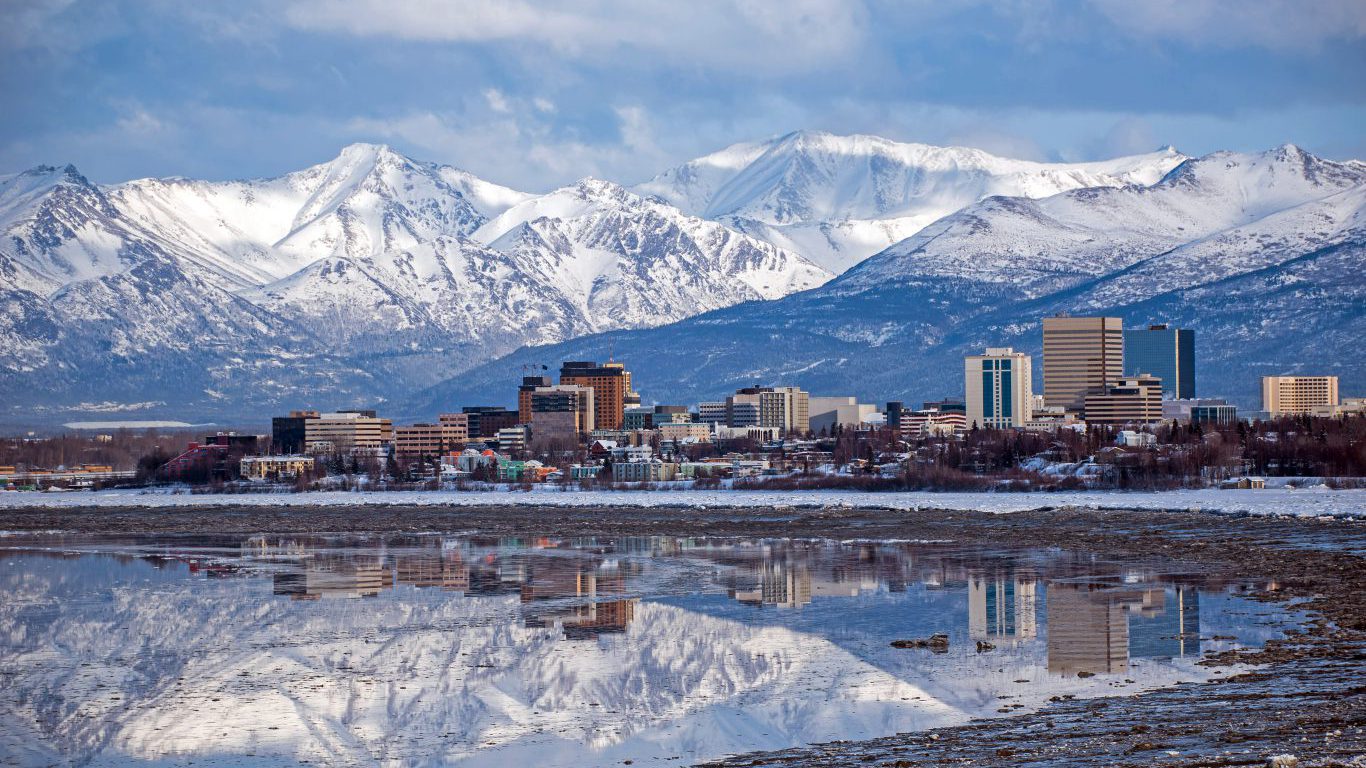
2. Alaska
> Most educated city: Anchorage
> Pct. of adults with a bachelor’s degree or higher: 32.2%
> Median household income: $82,203
> Unemployment rate: 6.5%
> Number of postsecondary institutions: 5
Both metro areas in Alaska — Anchorage and Fairbanks — are home to a larger share of adults with at least bachelor’s degree than the statewide share of 29.6%. In Anchorage, 32.2% of adults have a bachelor’s degree, a higher share than the 31.5% share in Fairbanks.
Across broad populations, greater educational attainment generally leads to higher incomes. Anchorage is not only Alaska’s most educated metro area, but also its highest earning. The typical Anchorage household earns $82,203 a year, compared to $77,328 in Fairbanks and $76,440 statewide.

3. Arizona
> Most educated city: Flagstaff
> Pct. of adults with a bachelor’s degree or higher: 35.4%
> Median household income: $55,091
> Unemployment rate: 5.0%
> Number of postsecondary institutions: 4
Some 35.4% Flagstaff, Arizona’s adult population earned at least a bachelor’s degree. Despite its relatively high education level compared to the rest of the state, Flagstaff has a surprisingly high poverty rate. Nearly 18% of its residents live below the poverty level, compared to the U.S. poverty rate of 14%. Flagstaff also has relatively few postsecondary institutions at just four.
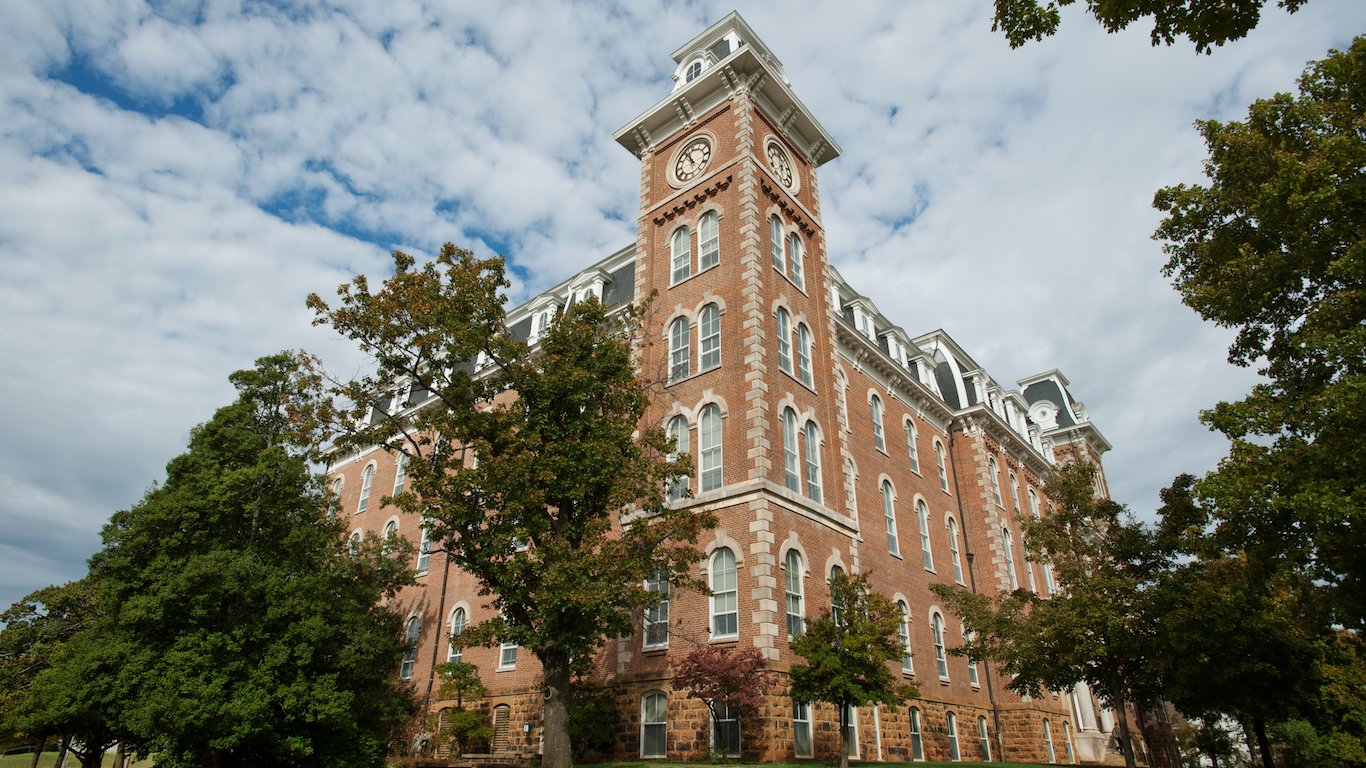
4. Arkansas
> Most educated city: Fayetteville-Springdale-Rogers
> Pct. of adults with a bachelor’s degree or higher: 30.9%
> Median household income: $51,848
> Unemployment rate: 2.6%
> Number of postsecondary institutions: 11
Some 30.9% of adults in Fayetteville-Springdale-Rogers have at least a bachelor’s degree — the largest share of any of Arkansas’ six metro areas and well above the statewide bachelor’s degree attainment rate of 22.4%. A college education often leads to greater job opportunities, and in Fayetteville, joblessness is relatively uncommon. Only 2.6% of the metro area’s labor force is unemployed, by far the smallest share among metro areas in the state.
[in-text-ad-2]

5. California
> Most educated city: San Jose-Sunnyvale-Santa Clara
> Pct. of adults with a bachelor’s degree or higher: 50.1%
> Median household income: $110,040
> Unemployment rate: 3.7%
> Number of postsecondary institutions: 32
San Jose-Sunnyvale-Santa Clara is the only metro area in California — and one of only eight nationwide — where over half of all adults have at least a bachelor’s degree. The high level of education is likely attributable to the kinds of jobs available in the area. Also known as Silicon Valley, the San Jose-Sunnyvale-Santa Clara area is home to dozens of major technology companies, including Google, Facebook, and Apple. Jobs at such companies attract college-educated adults from around the country and also tend to be high paying. The typical household in the area earns $110,040 a year, the highest median income of any U.S. metro area.

6. Colorado
> Most educated city: Boulder
> Pct. of adults with a bachelor’s degree or higher: 60.6%
> Median household income: $74,615
> Unemployment rate: 1.9%
> Number of postsecondary institutions: 9
A whopping 60.6% of adults in Boulder have at least a bachelor’s degree — the highest share in both Colorado and the nation. Better educated populations are often more resilient to economic slumps, and Boulder’s 1.9% unemployment rate is the lowest of any U.S. metro area and well below the 4.4% nationwide jobless rate. Adults with a college education are also more likely to have well-paying jobs, and the typical Boulder household earns $74,615 a year — more than any other Colorado metro area and well above the $57,617 median household income nationwide.
[in-text-ad]

7. Connecticut
> Most educated city: Bridgeport-Stamford-Norwalk
> Pct. of adults with a bachelor’s degree or higher: 46.6%
> Median household income: $90,123
> Unemployment rate: 4.3%
> Number of postsecondary institutions: 20
Nearly 47% of adults in Bridgeport-Stamford-Norwalk hold at least a college degree, the highest share in Connecticut. The median household income in Bridgeport-Stamford-Norwalk is $90,123 a year, well above the state’s median income of $73,433. Though not all corners of the metro area are affluent, the 8.6% poverty rate in Bridgeport-Stamford-Norwalk is lower than Connecticut’s poverty rate of 9.8%.

8. Delaware
> Most educated city: Dover
> Pct. of adults with a bachelor’s degree or higher: 22.6%
> Median household income: $54,140
> Unemployment rate: 5.7%
> Number of postsecondary institutions: 5
The only metro area in Delaware, Dover, is the best educated by default. Educated adults in Delaware appear to be concentrated outside of Dover, as only 22.6% of metro area adults have at least a bachelor’s degree, well below the 31.0% share statewide. As is often the case across populations with lower educational attainment, Dover has a higher than typical jobless rate and relatively low incomes. Some 5.7% of Dover’s labor force are out of a job compared to the statewide unemployment rate of 4.9%. Similarly, the typical Dover household earns only $54,140 a year, about $7,600 less than the typical Delaware household.

9. Florida
> Most educated city: Tallahassee
> Pct. of adults with a bachelor’s degree or higher: 39.3%
> Median household income: $50,654
> Unemployment rate: 3.7%
> Number of postsecondary institutions: 8
Of the 22 major metropolitan areas throughout the Sunshine State, Tallahassee is home to the largest share of college-educated adults. Some 39.3% of area residents 25 and older have at least a bachelor’s degree, a difference of over 10 percentage points from the 28.6% statewide bachelor’s degree attainment rate.
As the state capital, Tallahassee’s economy is bolstered by government jobs — many of which require a college education. Some 22.9% of Tallahassee’s labor force work in state government, a larger share than in all but a handful of other metro areas nationwide.
[in-text-ad-2]

10. Georgia
> Most educated city: Atlanta-Sandy Springs-Roswell
> Pct. of adults with a bachelor’s degree or higher: 37.7%
> Median household income: $62,613
> Unemployment rate: 4.4%
> Number of postsecondary institutions: 101
Large metropolitan areas tend to provide more educational opportunities, and Atlanta is no different. The Atlanta area boasts more than 100 different postsecondary institutions like the Georgia Institute of Technology, which has an enrollment of nearly 30,000 students.
In addition to its high educational attainment rate, Atlanta is Georgia’s top spot for white-collar jobs. The area has the highest percentage of its labor force working in financial activities, information, and professional and business services in the state.

11. Hawaii
> Most educated city: Urban Honolulu
> Pct. of adults with a bachelor’s degree or higher: 34.4%
> Median household income: $80,513
> Unemployment rate: 2.3%
> Number of postsecondary institutions: 22
Urban Honolulu beat out Kahului-Wailuku-Lahaina, Hawaii’s only other metro area, as the state’s most educated city. Some 34.4% of the area’s adult population holds at least a bachelor’s degree.
Even though Urban Honolulu’s education attainment rate is not as high as compared to some other highly educated cities, it ranks high in several economic measures. Among all U.S. metro areas, it is in the top 10 in median household income at $80,513 and has the sixth-lowest unemployment rate at 2.3%. However, both of those figures are bolstered by the state’s strong economy. The Aloha State has a median annual household income of $74,511 and a 2.6% unemployment rate, compared to the U.S. median household income of $57,617 and an unemployment rate of 4.4%.
[in-text-ad]

12. Idaho
> Most educated city: Boise City
> Pct. of adults with a bachelor’s degree or higher: 31.3%
> Median household income: $55,162
> Unemployment rate: 2.7%
> Number of postsecondary institutions: 21
Some 31.3% of adults 25 and older in the Boise, Idaho metro area have at least a four-year college degree — tied with the Idaho Falls metro area as the highest share in the state. However, as a percentage of the total population, the Boise metro area is home to the largest share of college educated residents.
Adults in Boise do not need to travel far for a college education. There are some 21 colleges and universities across the metro area, by far the greatest concentration of any metro area in Idaho.
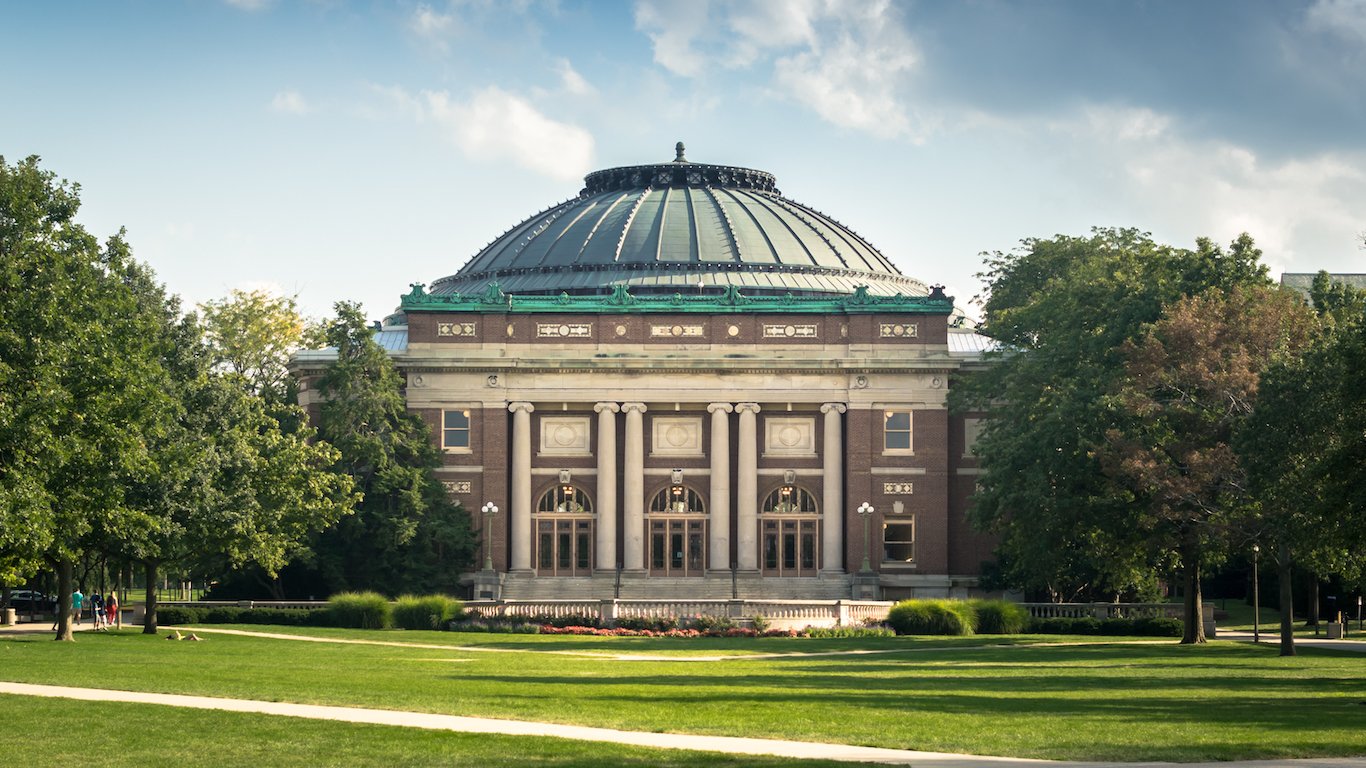
13. Illinois
> Most educated city: Champaign-Urbana
> Pct. of adults with a bachelor’s degree or higher: 42.3%
> Median household income: $50,564
> Unemployment rate: 4.2%
> Number of postsecondary institutions: 5
Champaign-Urbana is Illinois’ most educated city as 42.3% of its adult residents have earned a four-year degree. It narrowly beat out last year’s top ranked city, Bloomington, which finished one spot behind Champaign-Urbana with a 42.2% bachelor’s degree attainment rate.
Champaign-Urbana is home to the University of Illinois. The state’s flagship university has more than 47,000 students enrolled. College educated adults are less likely to face serious financial difficulties and Urbana-Champaign has the lowest food stamp or SNAP benefit recipiency rate among all of Illinois’ metro areas.

14. Indiana
> Most educated city: Bloomington
> Pct. of adults with a bachelor’s degree or higher: 38.9%
> Median household income: $43,693
> Unemployment rate: 4.1%
> Number of postsecondary institutions: 2
Though Bloomington has only two postsecondary educational institutions — far fewer than is typical among metro areas on this list — one of the area’s schools is among the largest in the country. The University of Indiana Bloomington enrolls nearly 50,000 students total.
More education usually leads to higher income and less poverty, but that is not the case in Bloomington, which has one of the lowest median household incomes of Indiana’s metro areas. At $43,693 a year, Bloomington’s median household income is well below the state median of $52,314. Bloomington also has the highest poverty rate in the state. Some 23.7% of Bloomington’s residents live in poverty, compared to 14.1% of Indiana residents as a whole.
[in-text-ad-2]

15. Iowa
> Most educated city: Ames
> Pct. of adults with a bachelor’s degree or higher: 54.8%
> Median household income: $53,371
> Unemployment rate: 2.1%
> Number of postsecondary institutions: 2
Ames, Iowa is one of only a handful of metro areas nationwide where over half of all adults 25 and older have at least a bachelor’s degree. Some 54.8% of adults in the metro area have earned a four-year college degree, the largest share of any metro area in the state and the second highest nationwide.
The high educational attainment rate in Ames is likely bolstered by the presence of Iowa State University, one of the largest postsecondary institutions in the state. Tuition for in state residents is less than half the amount students from out of state pay.
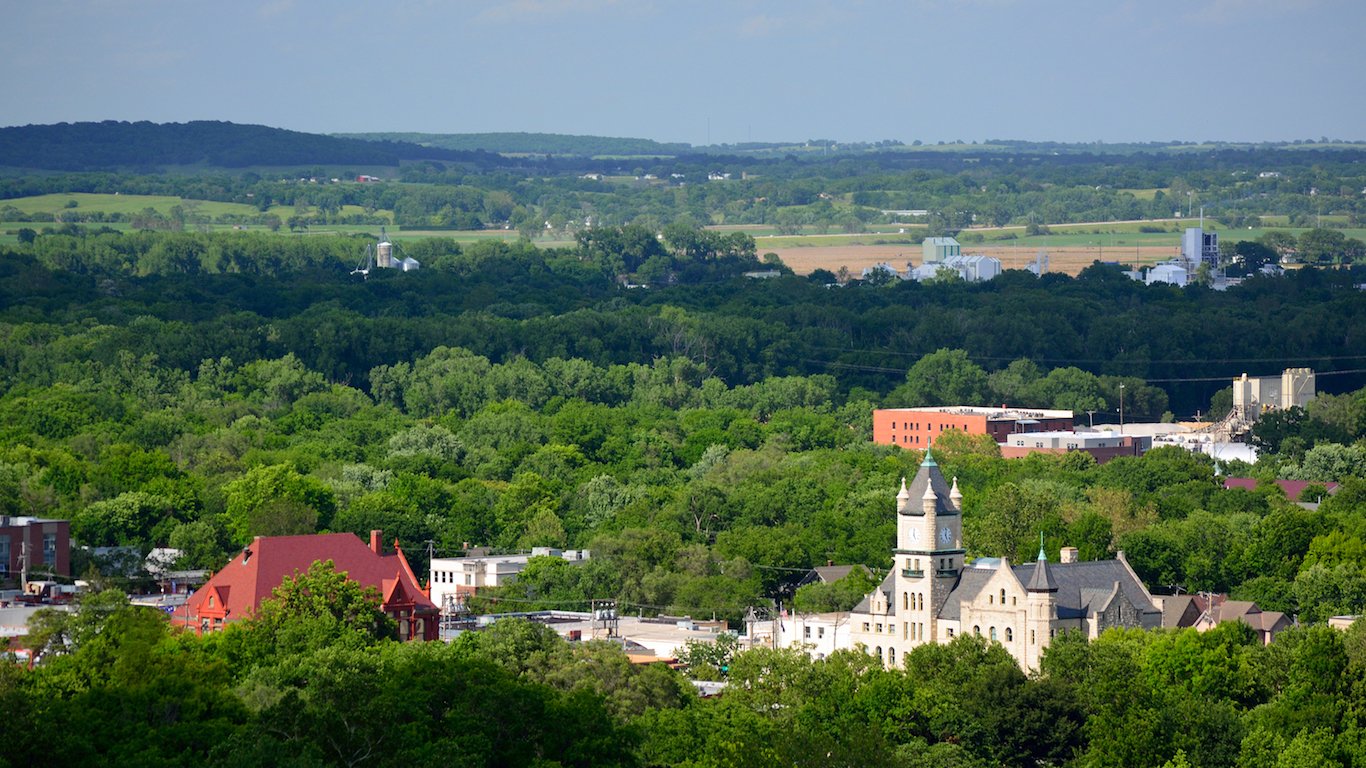
16. Kansas
> Most educated city: Lawrence
> Pct. of adults with a bachelor’s degree or higher: 52.0%
> Median household income: $56,345
> Unemployment rate: 3.2%
> Number of postsecondary institutions: 6
Lawrence is the most educated metro area in Kansas and the fifth-most educated metro area in the nation as 52% of its adult residents have at least a bachelor’s degree. As might be expected, the city also has one of the highest high school graduation rates in the country.
Despite the high education levels, Lawrence still struggles with poverty. The city’s poverty rate of 17.1% is 5 percentage points higher than the state level. Somewhat paradoxically, Lawrence has one of the lowest food stamp or SNAP benefit recipiency rates in the United States.
[in-text-ad]

17. Kentucky
> Most educated city: Lexington-Fayette
> Pct. of adults with a bachelor’s degree or higher: 37.2%
> Median household income: $53,769
> Unemployment rate: 4.1%
> Number of postsecondary institutions: 19
Adults with a college degree are less susceptible to economic downturns and the threat of joblessness. With a 4.1% unemployment rate, Lexington-Fayette is the only metro area in Kentucky where the jobless rate falls below the comparable 4.4% U.S. figure. The highly educated population partially explains the area’s relatively strong economy. An estimated 37.2% of area adults have at least a bachelor’s degree, the highest share of any metro area in the state and well above the comparable share of adults across Kentucky of 23.4%.

18. Louisiana
> Most educated city: New Orleans-Metairie
> Pct. of adults with a bachelor’s degree or higher: 29.4%
> Median household income: $48,804
> Unemployment rate: 5.0%
> Number of postsecondary institutions: 31
One of the least educated states in the country, Louisiana’s 23.4% bachelor’s degree attainment rate is well below the corresponding 31.3% nationwide rate. Even in New Orleans, the most educated metro area in the state, only 29.4% adults have earned a four-year college degree.
In New Orleans, an adult with a college education typically earns about $16,000 more than adults with only a high school education. Indeed, higher incomes among the metro area’s relatively large share of college educated adults may explain why serious financial hardship is less common in New Orleans than in any of Louisiana’s eight other metro areas. An estimated 17% of New Orleans residents live in poverty compared to 20.2% of people across the state.
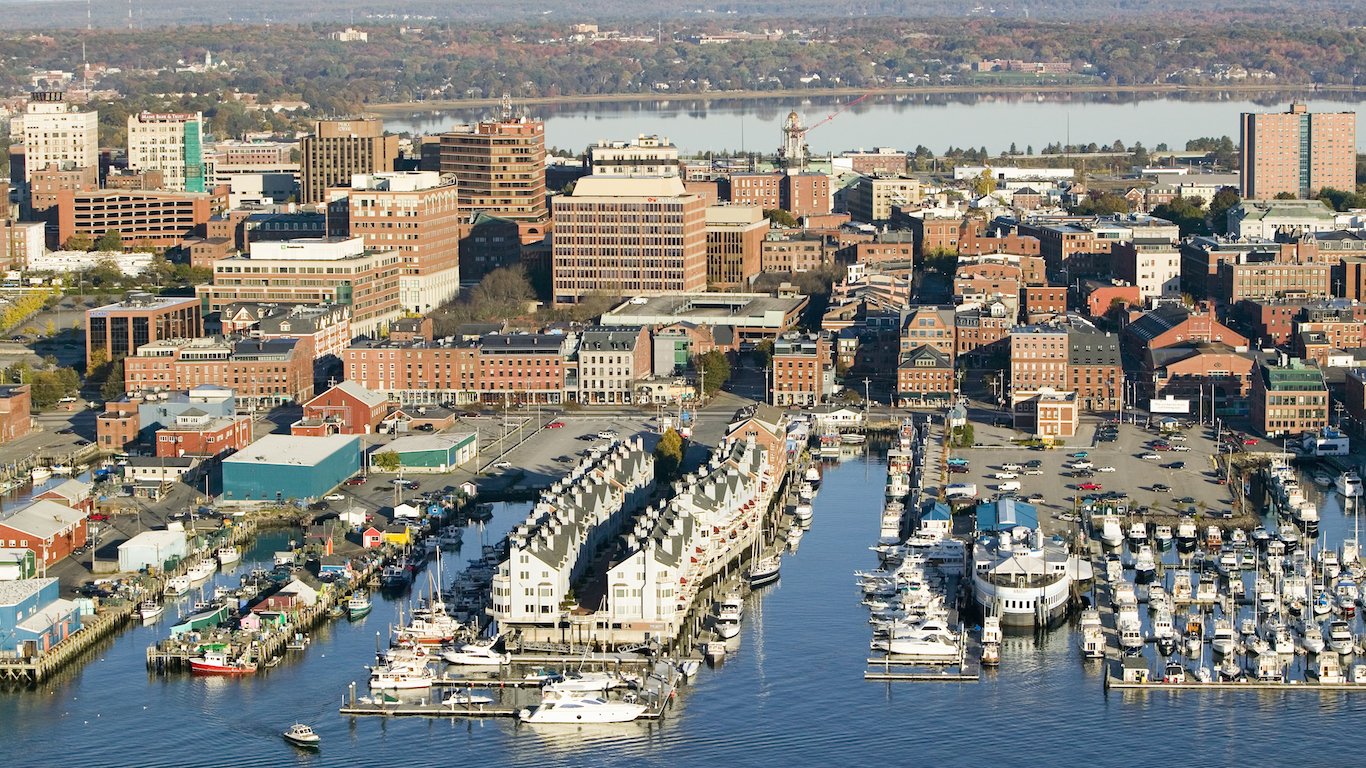
19. Maine
> Most educated city: Portland-South Portland
> Pct. of adults with a bachelor’s degree or higher: 39.1%
> Median household income: $63,422
> Unemployment rate: 2.8%
> Number of postsecondary institutions: 17
Portland-South Portland does not have much competition with only two other metropolitan areas in the state. Still, it is the most educated city in Maine. And the area’s high educational attainment has likely helped it achieve relative financial prosperity.
In Portland, 39.1% of adults have a bachelor’s degree, well above Maine’s 30.1% bachelor’s degree attainment rate. Portland’s median household income of $63,422 a year is also well above the state figure of $53,079 and the national figure of $57,617. The metro area’s poverty rate of 9.1% is also one of the lowest among U.S. metro areas.
[in-text-ad-2]

20. Maryland
> Most educated city: Baltimore-Columbia-Towson
> Pct. of adults with a bachelor’s degree or higher: 39.5%
> Median household income: $76,788
> Unemployment rate: 4.1%
> Number of postsecondary institutions: 50
College educated adults in Maryland tend to live outside of major metropolitan areas. Some 39.5% of adults in the Baltimore metro area have a bachelor’s degree, roughly in line with the share of adults across Maryland, but far greater than the comparable share in any of the state’s other four metro areas. The higher educational attainment rate in the Baltimore metro area is likely due in part to the concentration of educational institutions in the area. There are 50 colleges and universities throughout Baltimore-Columbia-Towson — more than five times the number in any other Maryland metro area.

21. Massachusetts
> Most educated city: Boston-Cambridge-Newton
> Pct. of adults with a bachelor’s degree or higher: 46.9%
> Median household income: $82,380
> Unemployment rate: 3.6%
> Number of postsecondary institutions: 134
Some 46.9% of adults in the Boston area have a bachelor’s degree, and there are certainly no shortage of institutions for them to continue their education. The area is home to 134 postsecondary institutions, including Boston University, Northeastern University, and Harvard University.
Median household income in Massachusetts is already one of the higher incomes among states at more than $75,000 a year, and the Boston area exceeds it with a median household income of $82,380 a year.
[in-text-ad]
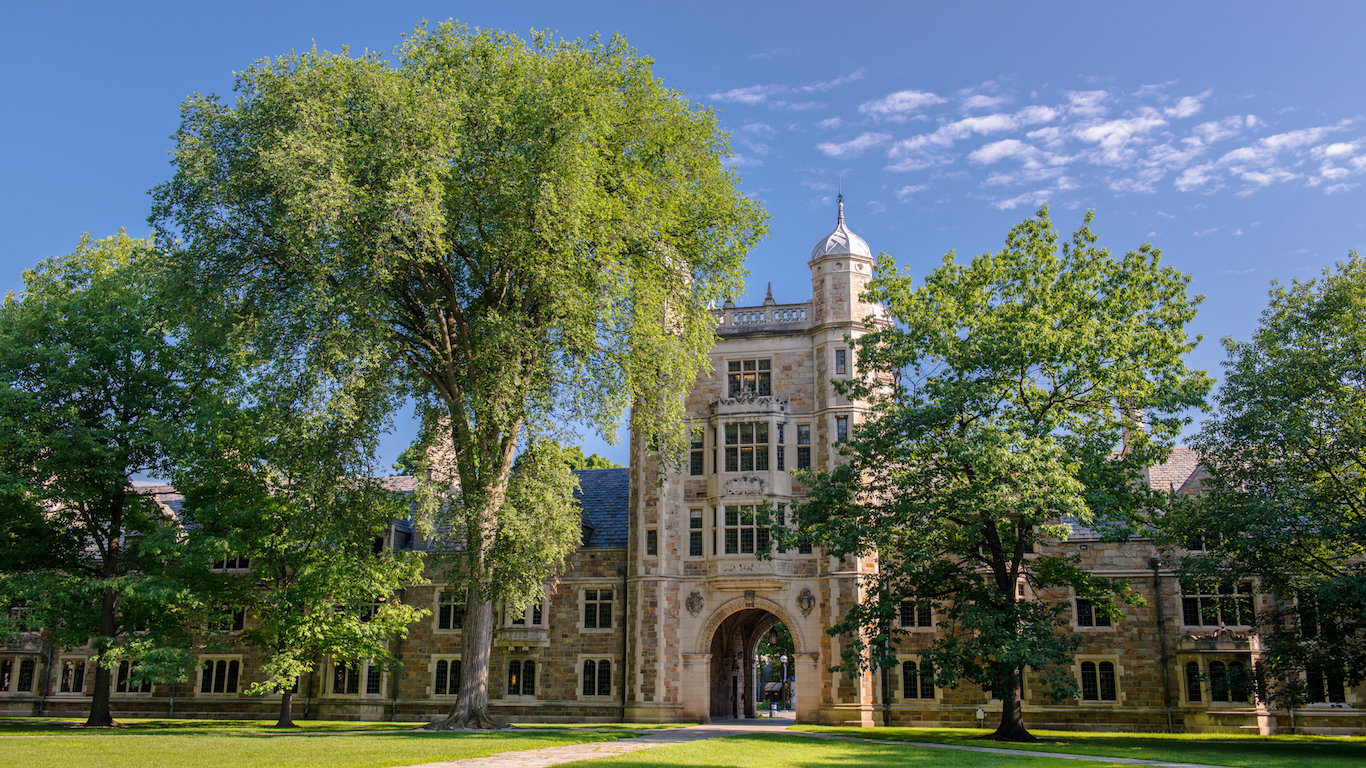
22. Michigan
> Most educated city: Ann Arbor
> Pct. of adults with a bachelor’s degree or higher: 54.8%
> Median household income: $65,601
> Unemployment rate: 3.4%
> Number of postsecondary institutions: 8
Ann Arbor ranks as the most educated city in MIchigan and the second most educated city in the United States. Most of the city’s adult residents, 54.8%, hold at least a bachelor’s degree. The area’s high education attainment is likely partly due to the fact that the University of Michigan is in Ann Arbor. The university had more than 44,000 students in the fall of 2016.
A large chunk of Ann Arbor’s educational skills are likely being put to use in state government. At 29.9%, the city has a larger percentage of its labor force working in state government than any other metro area in the country.

23. Minnesota
> Most educated city: Minneapolis-St. Paul-Bloomington
> Pct. of adults with a bachelor’s degree or higher: 40.5%
> Median household income: $73,231
> Unemployment rate: 3.5%
> Number of postsecondary institutions: 88
The Twin Cities metro area is the only major urban area in Minnesota where over 40% of adults have at least a bachelor’s degree. Across Minnesota, only 34.8% of adults have a bachelor’s degree. Better educated populations tend to report higher incomes — and the population of the Minneapolis-St. Paul metro area is no exception. The typical area household earns $73,231 a year, more than in any other metro area in the state and well above the median household income across Minnesota of $65,599.

24. Mississippi
> Most educated city: Jackson
> Pct. of adults with a bachelor’s degree or higher: 29.9%
> Median household income: $50,632
> Unemployment rate: 4.6%
> Number of postsecondary institutions: 22
With the exception of West Virginia, Mississippi is the least educated state in the country. Across Mississippi, only 21.8% of adults have earned a four-year college degree. Educational attainment rates are not uniform across the state, however. In Jackson, 29.9% of adults have earned a bachelor’s degree, the largest share of any metro area in the state, yet still slightly lower than the bachelor’s degree attainment rate nationwide of 31.3%.
[in-text-ad-2]

25. Missouri
> Most educated city: Columbia
> Pct. of adults with a bachelor’s degree or higher: 43.9%
> Median household income: $52,752
> Unemployment rate: 2.5%
> Number of postsecondary institutions: 7
The University of Missouri, the state’s flagship university, is located in Columbia. So it is no surprise that Columbia’s adult population has a higher percentage of degree holders than anywhere else in the Show-Me State.
An estimated 43.9% of Columbia’s adult residents have graduated from college, a far greater share than the across the state. Only 28.5% of Missouri adults hold a degree. Columbia’s high educational attainment has likely contributed to its low unemployment rate of just 2.5% — one of the lowest of U.S. cities.

26. Montana
> Most educated city: Missoula
> Pct. of adults with a bachelor’s degree or higher: 41.1%
> Median household income: $46,550
> Unemployment rate: 3.5%
> Number of postsecondary institutions: 2
Nationwide, the typical bachelor’s degree holder earns about $21,700 more annually than a person who didn’t complete education beyond high school. In Missoula, the financial incentive to complete higher education is far less pronounced. The median income of adults with a four-year college degree is $32,175 a year — only about $7,800 more than the median income among high school graduates in the metro area. Still, of the three metro areas in Montana, only in Missoula have over 40% of adults 25 and older earned at least a bachelor’s degree.
[in-text-ad]

27. Nebraska
> Most educated city: Lincoln
> Pct. of adults with a bachelor’s degree or higher: 39.8%
> Median household income: $59,344
> Unemployment rate: 2.5%
> Number of postsecondary institutions: 13
Nearly 40% of Lincoln’s adult residents hold a college degree, the highest share of any metro area in Nebraska. Located in Lincoln, the University of Nebraska had an enrollment of more than 25,000 students in 2016.
Even though it is the most educated city in the state, Lincoln’s median household income of $59,344 a year just barely surpassed Nebraska’s median income of $56,927. Also, the area’s poverty rate of 12.4% is 1 percentage point higher than the statewide poverty rate.
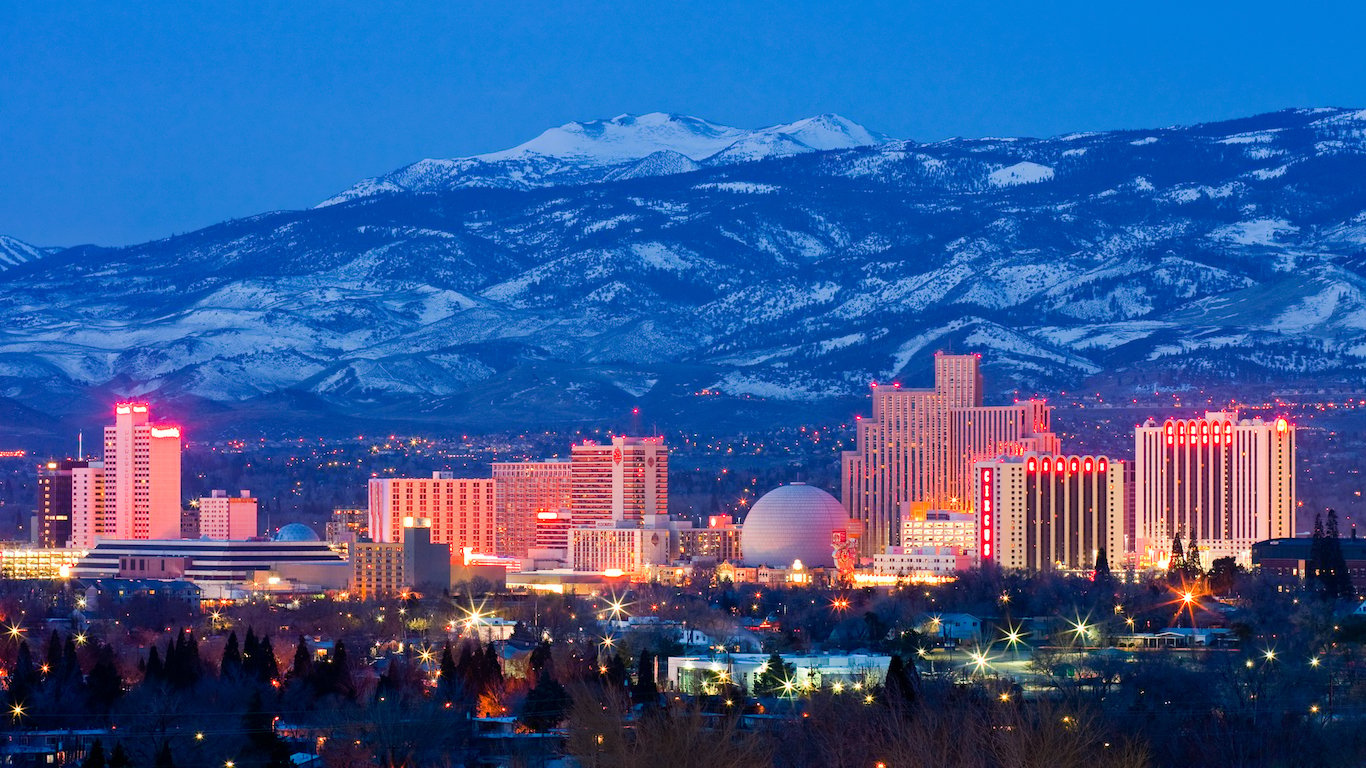
28. Nevada
> Most educated city: Reno
> Pct. of adults with a bachelor’s degree or higher: 29.2%
> Median household income: $58,056
> Unemployment rate: 4.2%
> Number of postsecondary institutions: 13
Fewer than 1 in every 4 adults in Nevada have at least a bachelor’s degree, a smaller share than in all but a handful of other states. However, some parts of the state are better educated than others. In the Reno metro area, some 29.2% of adults have earned a four-year college degree, the highest share in the state but still slightly below the nationwide bachelor’s degree attainment rate of 31.3%.
Areas with higher educational attainment tend report higher incomes, and Reno is no exception. The typical area household earns $58,056 a year, the highest median income of any metro area in the state.

29. New Hampshire
> Most educated city: Manchester-Nashua
> Pct. of adults with a bachelor’s degree or higher: 37.3%
> Median household income: $76,254
> Unemployment rate: 2.6%
> Number of postsecondary institutions: 17
Manchester-Nashua is the only place in New Hampshire that qualifies as a metropolitan area, so it is the state’s most educated area by default. Some 37.3% of Manchester-Nashua’s adults hold at least a bachelor’s degree, slightly above New Hampshire’s college attainment rate of 36.6%.
The area also has one of the lowest poverty rates in the nation with 8.2% of people living in poverty. Still, this is higher than New Hampshire’s poverty rate of 7.2%, which is the lowest of any state.
[in-text-ad-2]

30. New Jersey
> Most educated city: Trenton
> Pct. of adults with a bachelor’s degree or higher: 42.7%
> Median household income: $77,650
> Unemployment rate: 4.1%
> Number of postsecondary institutions: 11
Trenton is one of several state capitals to rank as the most educated metro areas within their respective states. Some 42.7% of adults in the Trenton metro area have a college degree or higher, well above the 38.6% share of adults across New Jersey. As is often the case, the most educated metro area in New Jersey also has the highest earning population. The typical household in the metro area earns $77,650 a year, about $1,500 more than the the typical New Jersey household and roughly $20,000 more than the typical American household.

31. New Mexico
> Most educated city: Santa Fe
> Pct. of adults with a bachelor’s degree or higher: 41.7%
> Median household income: $57,863
> Unemployment rate: 5.2%
> Number of postsecondary institutions: 7
Santa Fe is New Mexico’s most educated city with more than 40% of its adult residents holding at least a college degree. Santa Fe beat out New Mexico’s three other metro areas: Albuquerque, Las Cruces, and Farmington.
Santa Fe’s poverty rate of 14.3% is more than 5 percentage points below the state poverty rate of 19.8%. Similarly, the metro area’s 5.2% jobless rate — while higher than that of most metro areas — compares favorably to the 6.3% statewide unemployment rate.
[in-text-ad]
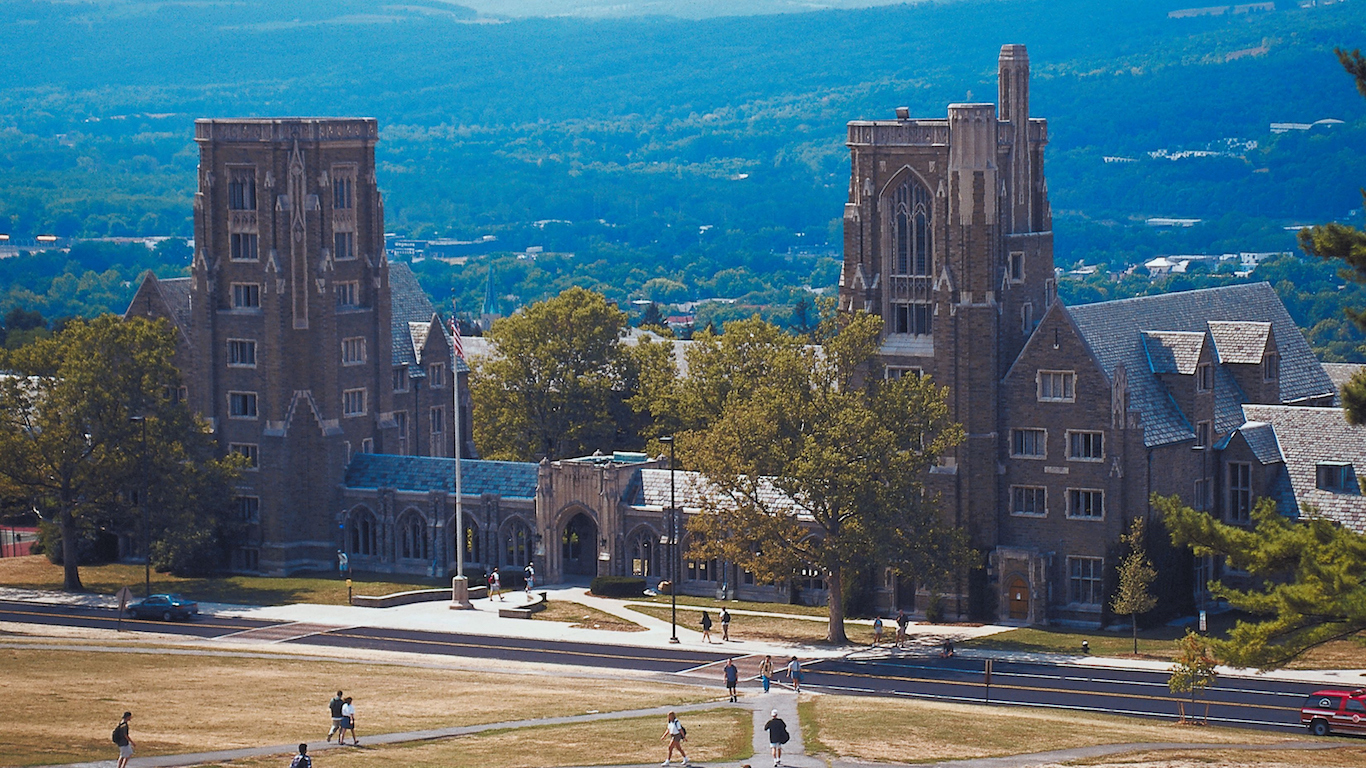
32. New York
> Most educated city: Ithaca
> Pct. of adults with a bachelor’s degree or higher: 51.7%
> Median household income: $56,349
> Unemployment rate: 4.2%
> Number of postsecondary institutions: 4
In several states, the most educated metro area is a college town, and few American college towns are as iconic as Ithaca, New York. Home to Cornell University and Ithaca College, Ithaca is the only metro area in the state in which over half of all adults have a four-year college degree.
As is often the case in metro areas with well-educated populations, Ithaca’s economy is relatively healthy. Only 4.2% of Ithaca’s labor force is out of a job, the lowest unemployment rate of any New York metro area and well below the statewide unemployment rate of 4.8%.

33. North Carolina
> Most educated city: Raleigh
> Pct. of adults with a bachelor’s degree or higher: 47.2%
> Median household income: $71,685
> Unemployment rate: 3.6%
> Number of postsecondary institutions: 21
With a 47.2% bachelor’s degree attainment rate, Raleigh is the most educated metro area in North Carolina and one of the most educated in the United States. Higher educational attainment often leads to higher paying jobs, and incomes in Raleigh are far above comparable figures across the state. The typical Raleigh household earns $71,685 a year, about $21,100 more than the typical North Carolina household.

34. North Dakota
> Most educated city: Fargo
> Pct. of adults with a bachelor’s degree or higher: 38.9%
> Median household income: $60,009
> Unemployment rate: 2.2%
> Number of postsecondary institutions: 10
Fargo beat out Bismarck and Grand Forks as North Dakota’s most educated city. Some 38.9% of Fargo’s adults graduated from college, compared to 29.6% of North Dakotan adults overall.
Fargo has the nation’s fourth-lowest unemployment rate at just 2.2%. The state’s job market as a whole is very strong. North Dakota’s unemployment rate is just a tick higher than Fargo’s at 2.3%. That number gives North Dakota the lowest unemployment rate of any state.
[in-text-ad-2]

35. Ohio
> Most educated city: Columbus
> Pct. of adults with a bachelor’s degree or higher: 36.0%
> Median household income: $60,294
> Unemployment rate: 4.3%
> Number of postsecondary institutions: 59
Columbus has a higher share of adults with at least a bachelor’s degree than any of Ohio’s 10 other metro areas. The city’s 36.0% college attainment rate exceeds the Buckeye State’s rate of 27.5%.
Columbus has much going for it. It is home to Ohio State University, which has one of the largest enrollments among U.S. universities. Nearly 60,000 students attend the school’s Columbus campus. Columbus is also the state capital, which may explain why 5.8% of the city’s labor force hold state government jobs, many of which require a college degree.
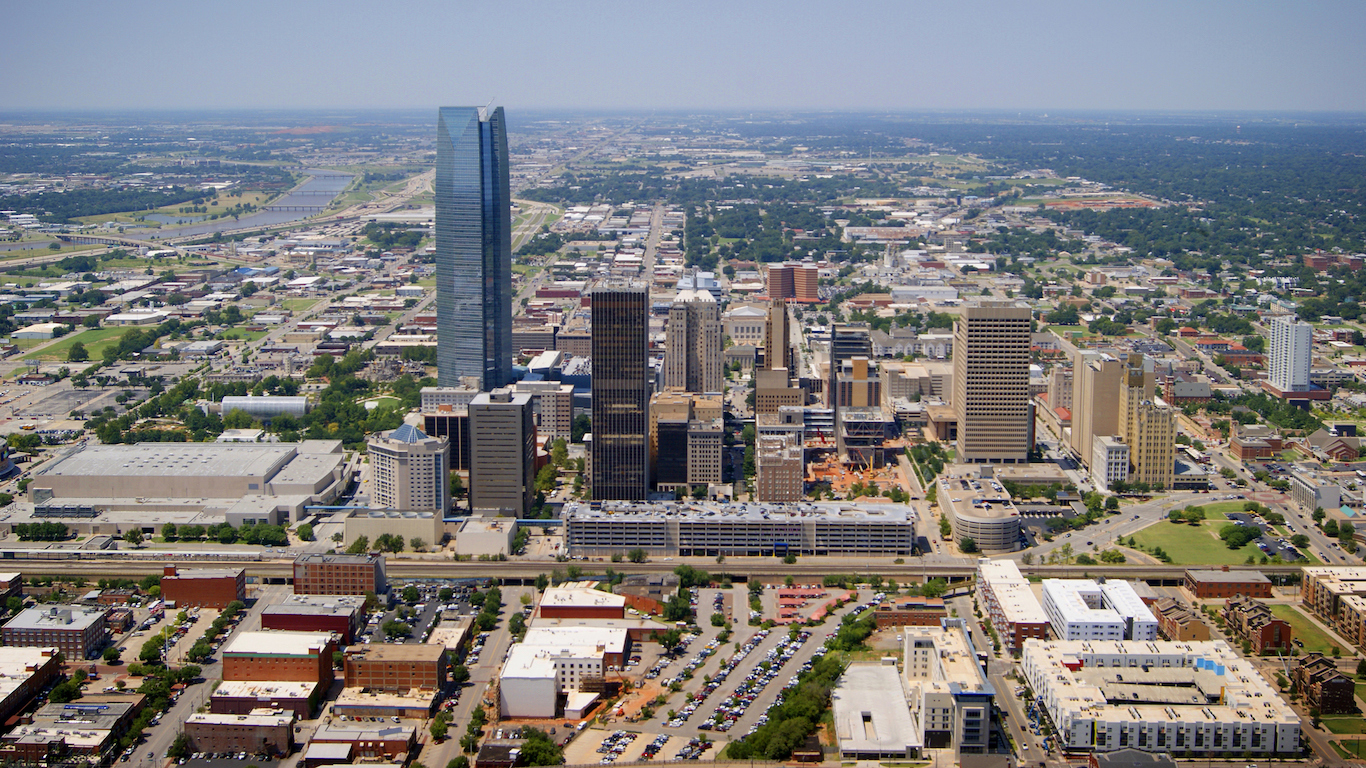
36. Oklahoma
> Most educated city: Oklahoma City
> Pct. of adults with a bachelor’s degree or higher: 29.8%
> Median household income: $55,065
> Unemployment rate: 4.2%
> Number of postsecondary institutions: 42
Oklahoma City has a higher percentage of degree-holding adults than any other metro area in Oklahoma at 29.8%. Still, the city’s college attainment rate is below the national share of adults with a degree at 31.3%.
Home to 42 higher learning institutions, Oklahoma City provides more postsecondary education options than any other area in Oklahoma. Many of those with a college degree in Oklahoma City likely work in government. Oklahoma City is the state capital and 6.2% of the area labor force work in the state government, the largest share of any city in the state.
[in-text-ad]

37. Oregon
> Most educated city: Corvallis
> Pct. of adults with a bachelor’s degree or higher: 54.2%
> Median household income: $55,459
> Unemployment rate: 3.4%
> Number of postsecondary institutions: 2
Corvallis is not just the most educated city in Oregon, but also one of the most educated cities nationwide. It is one of the few metro areas where the majority of adults have a college degree at 54.2%. The high college attainment rate is likely partly due to the fact that Oregon State University is located Corvallis. The university has nearly 25,000 enrolled students.
Corvallis has the highest percentage of local government workers of any metro area in the nation. Some 23.6% of its workforce is employed by the local government. Such public policy jobs often require a college education.

38. Pennsylvania
> Most educated city: State College
> Pct. of adults with a bachelor’s degree or higher: 48.3%
> Median household income: $60,266
> Unemployment rate: 3.4%
> Number of postsecondary institutions: 5
Aptly named, State College has the highest percentage of people who graduated from college of any city in Pennsylvania. State College also ranks first in Pennsylvania and 10th nationally in high school graduation rate as well.
The benefits of education are apparent in State College. The metro area boasts the lowest unemployment rate, and food stamps or SNAP benefit recipiency rate of all metro areas in Pennsylvania.

39. Rhode Island
> Most educated city: Providence-Warwick
> Pct. of adults with a bachelor’s degree or higher: 32.4%
> Median household income: $61,948
> Unemployment rate: 4.2%
> Number of postsecondary institutions: 37
Providence-Warwick is the only metro area in Rhode Island, and the most educated by default. The area’s bachelor’s degree attainment rate of 32.4% is actually lower than the state rate of 34.1%.
Providence-Warwick’s unemployment rate of 4.2% is fairly close to the state’s 4.3% rate. The same goes for the area’s median household income of $61,948 a year, which is not much higher than the state median of $60,596. The metro area’s poverty rate of 12% also trends closely to the state poverty rate of 12.8%.
[in-text-ad-2]

40. South Carolina
> Most educated city: Hilton Head Island-Bluffton-Beaufort
> Pct. of adults with a bachelor’s degree or higher: 38.0%
> Median household income: $63,756
> Unemployment rate: 3.9%
> Number of postsecondary institutions: 2
Like many cities on this list, Hilton Head Island-Bluffton-Beaufort’s highest in the state college attainment rate appears to have a positive impact on economic conditions. The metro area also has the highest median income and lowest poverty rate of any of South Carolina’s eight metro areas.
Located at the southern tip of South Carolina, the Hilton Head Island-Bluffton-Beaufort relies heavily on its tourist industry. The economy is one of the most dependent on leisure and hospitality in the country. More than 21% of its workforce is in the business of helping people relax.

41. South Dakota
> Most educated city: Sioux Falls
> Pct. of adults with a bachelor’s degree or higher: 34.1%
> Median household income: $63,931
> Unemployment rate: 3.0%
> Number of postsecondary institutions: 11
With 34.1% of adult residents holding a college degree, Sioux Falls is South Dakota’s most educated city. However, Sioux Falls did not have much competition as the state has only one other metro area, Rapid City.
Sioux Falls’ median household income is nearly $10,000 higher than the state median household income. At 10.4%, the area also has the third highest percentage of its labor force working in the financial activities industry of any metro area in the country. Jobs in finance typically require at least a bachelor’s degree.
[in-text-ad]

42. Tennessee
> Most educated city: Nashville-Davidson–Murfreesboro–Franklin
> Pct. of adults with a bachelor’s degree or higher: 34.2%
> Median household income: $60,030
> Unemployment rate: 2.7%
> Number of postsecondary institutions: 56
The Nashville metro area is the only city in Tennessee where households earn higher income than the U.S. median household income. With an unemployment rate of 2.7%, Nashville is also the only metro area in the state with a jobless rate below the state rate of 3.3%.
Nashville’s college attainment rate is 5 percentage points higher than the next closest area in Tennessee. Likely, the Nashville area’s 56 postsecondary institutions like Vanderbilt University, Middle Tennessee State University, and Belmont University contribute to the area’s higher educational attainment.

43. Texas
> Most educated city: Austin-Round Rock
> Pct. of adults with a bachelor’s degree or higher: 42.8%
> Median household income: $71,000
> Unemployment rate: 3.1%
> Number of postsecondary institutions: 43
Of the 25 metro areas in Texas, the Austin-Round Rock area has the highest college attainment rate at 42.8%. Austin’s poverty rate of 10.9% is also nearly 5 percentage points lower than the state poverty rate. The metro area also has the lowest percentage of people using SNAP or food stamps of any Texas metro area.
With more than 50,000 total students, the University of Texas at Austin is one of the largest schools in the country. Austin is also the state capital, drawing in many professionals with degrees.

44. Utah
> Most educated city: Provo-Orem
> Pct. of adults with a bachelor’s degree or higher: 38.2%
> Median household income: $69,288
> Unemployment rate: 3.1%
> Number of postsecondary institutions: 18
Provo is Utah’s most educated city with more than 38% of its adult population holding at least a bachelor’s degree. The high educational attainment is likely bolstered by Brigham Young University. The college has over 33,000 total students.
Though Provo-Orem is Utah’s most educated metro area, three of Utah’s five metro areas have a college attainment rate above the state’s 32.6% rate. Logan’s bachelor’s degree attainment rate is 36.7%, and Salt Lake City’s is 33.0%.
[in-text-ad-2]

45. Vermont
> Most educated city: Burlington-South Burlington
> Pct. of adults with a bachelor’s degree or higher: 43.2%
> Median household income: $66,367
> Unemployment rate: 2.4%
> Number of postsecondary institutions: 8
Even though Burlington-South Burlington is Vermont’s only metro area and is the state’s most educated city by default, its college attainment rate is still impressive. More than 43% of adult residents hold at least a bachelor’s degree, well ahead of Vermont’s 36.4% college attainment rate.
The high level of education likely helps Burlington enjoy a strong economy. At just 2.4%, the area’s unemployment rate is the ninth-lowest in the country.
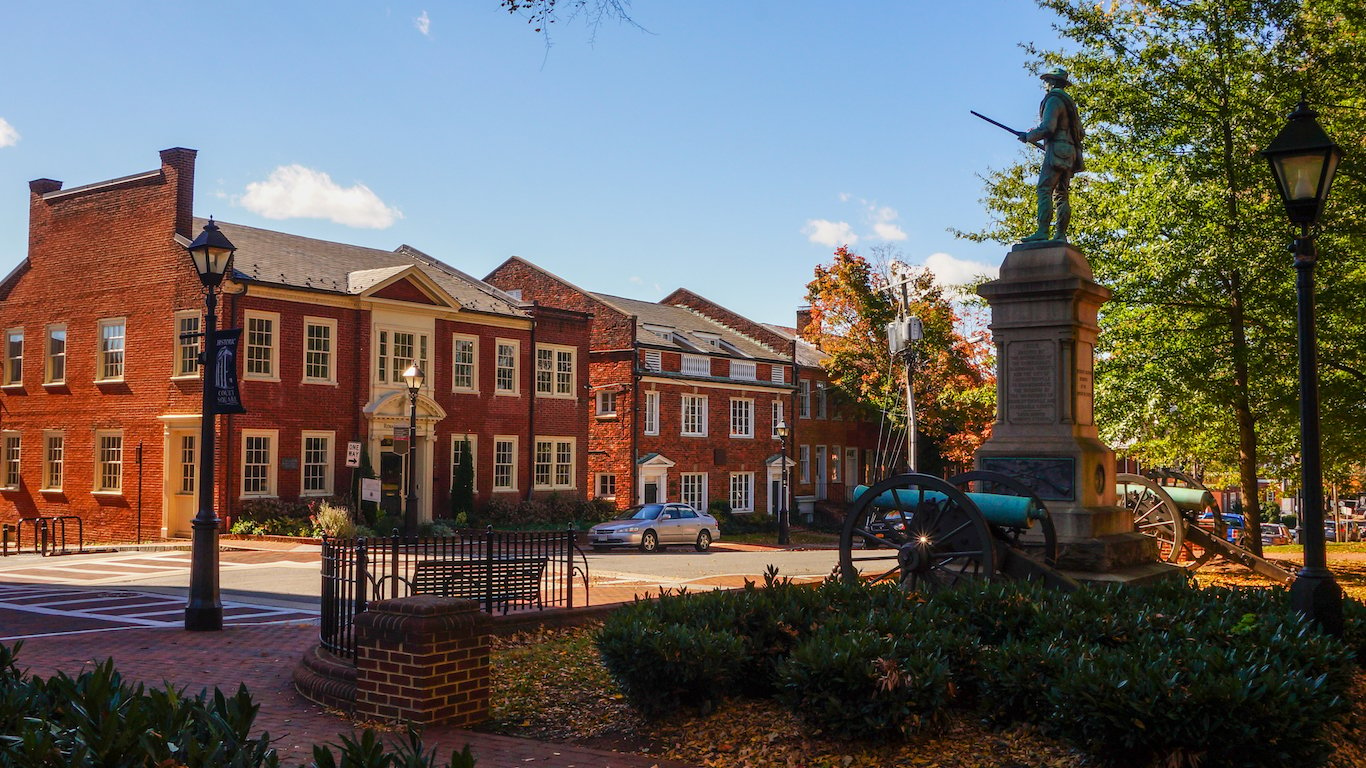
46. Virginia
> Most educated city: Charlottesville
> Pct. of adults with a bachelor’s degree or higher: 44.5%
> Median household income: $62,523
> Unemployment rate: 3.2%
> Number of postsecondary institutions: 3
Charlottesville, home of the University of Virginia, is easily ahead of all other Virginia metro areas in educational attainment. Some 44.5% of adult Charlottesville residents have at least a bachelor’s degree. Charlottesville is the only Virginia city with a higher bachelor’s degree attainment rate than the state rate of 38.1%.
A college education can open the door to more job opportunities, and Charlottesville’s unemployment rate of 3.2% is lower than all other metro areas in Virginia.
[in-text-ad]

47. Washington
> Most educated city: Seattle-Tacoma-Bellevue
> Pct. of adults with a bachelor’s degree or higher: 42.0%
> Median household income: $78,612
> Unemployment rate: 4.1%
> Number of postsecondary institutions: 68
Higher educational attainment can lead to more job opportunities and better-paying jobs, and the Seattle area is a great example of that. Some 42.0% of the area’s adult population hold at least a bachelor’s degree, and the median household income in the metro area of $78,612 a year is one of the highest in the country.
As Washington’s largest city, Seattle is home to 68 postsecondary institutions, the most of any metro area in the state. Some 5.5% of Seattle’s workforce is employed by the information industry, the largest such share in the nation.

48. West Virginia
> Most educated city: Morgantown
> Pct. of adults with a bachelor’s degree or higher: 32.7%
> Median household income: $50,120
> Unemployment rate: 4.0%
> Number of postsecondary institutions: 7
Home to the state’s flagship university, Morgantown is West Virginia’s most educated city. The West Virginia University Morgantown campus had over 28,000 students enrolled for the fall 2016 semester.
Compared to many other states’ most educated cities, the Morgantown population is less educated. However, given that West Virginia’s college attainment rate is just 20.8% — the worst of U.S. states — Morgantown’s 32.7% rate is higher than the national rate of 31.3%. Even though Morgantown’s educational attainment rate is well ahead of all other West Virginia metro areas, it has the highest poverty rate in the state. Some 20.1% of Morgantown residents live in poverty.

49. Wisconsin
> Most educated city: Madison
> Pct. of adults with a bachelor’s degree or higher: 46.6%
> Median household income: $68,497
> Unemployment rate: 2.5%
> Number of postsecondary institutions: 17
Madison’s 46.6% college attainment rate is one of the highest in the country and well ahead of Wisconsin’s 29.5% rate overall. The Madison population enjoys a very low unemployment rate of 2.5% and a relatively high median household income of $68,497, which is more than $10,000 higher than the state median.
Madison is yet another city on this list that is both the state capital and is home to a large state school. More than 10% of the city’s labor force work in state government jobs — many of which require a college degree.
[in-text-ad-2]

50. Wyoming
> Most educated city: Cheyenne
> Pct. of adults with a bachelor’s degree or higher: 27.3%
> Median household income: $62,221
> Unemployment rate: 3.6%
> Number of postsecondary institutions: 4
Cheyenne has a relatively low percentage of adults who have a bachelor’s degree, especially for the most educated city in its state. But the bachelor’s degree attainment rate in Casper, the state’s only other metro area, is even lower.
Cheyenne’s 27.3% college attainment rate just barely eclipses Wyoming’s rate of 27.1%. Despite the low educational attainment, Cheyenne also has a low poverty rate of 9.7%, as well as one of the lowest percentages of people using food stamps or SNAP benefits in the country at just 6.4%.
Detailed Findings and Methodology
Data from the U.S. Census Bureau shows that the more college graduates a metropolitan area has, the higher its median household income tends to be. Of the 50 metro areas on this list, 39 have a higher median household income than their respective state as a whole.
In many cases, a state’s most educated city, determined by the rate of adults with at least a bachelor’s degree, is also an education hub — home to schools with enrollment figures in the tens of thousands. Champaign-Urbana, Illinois, home to the University of Illinois, Austin, Texas, home to the University of Texas, and Morgantown, West Virginia, and its West Virginia University, are three such examples. The list is full other iconic college towns as well, including Boston, Massachusetts, Ithaca, New York, and Burlington, Vermont.
A disproportionately large share of metro areas on this list are also state capitals. Typically, relatively large shares of labor forces in capital cities work in state government jobs — which often require a college degree. More than one on every three metro areas on this list are also the capital of their respective state.
Many of those that are not state capitals are other large metropolitan areas able to provide lots of work opportunities to educated job seekers.
To identify the most educated cities in every state, 24/7 Wall St. reviewed the percentages of metro area adults who have earned at least a bachelor’s degree in every state. The college attainment rate, along with poverty, income, and high school attainment rates, as well as the percentage of households receiving SNAP benefits for metro areas and for states all came from the U.S. Census Bureau’s 2016 American Community Survey. Shares of each metro’s workforce employed in particular industries came from the Bureau of Labor Statistics. Unemployment figures are also from the BLS and are for August, 2017. The number of post-secondary institutions in each metropolitan area came from the U.S. Department of Education. Post-secondary institutions include four-year universities and colleges, as well as technical institutes and trade academies. The Washington-Arlington-Alexandria metro area, which spans the District of Columbia, Virginia, Maryland, and West Virginia was excluded from the ranking.
Sponsored: Want to Retire Early? Here’s a Great First Step
Want retirement to come a few years earlier than you’d planned? Or are you ready to retire now, but want an extra set of eyes on your finances?
Now you can speak with up to 3 financial experts in your area for FREE. By simply clicking here you can begin to match with financial professionals who can help you build your plan to retire early. And the best part? The first conversation with them is free.
Click here to match with up to 3 financial pros who would be excited to help you make financial decisions.
Thank you for reading! Have some feedback for us?
Contact the 24/7 Wall St. editorial team.
 24/7 Wall St.
24/7 Wall St. 24/7 Wall St.
24/7 Wall St. 24/7 Wall St.
24/7 Wall St.
